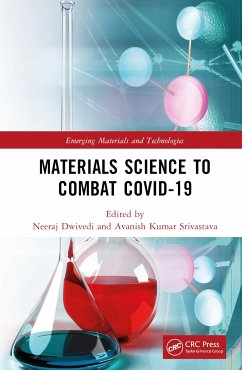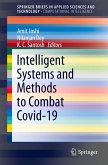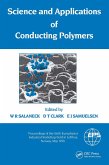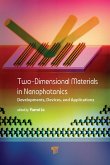Materials Science to Combat COVID-19
Herausgeber: Dwivedi, Neeraj; Srivastava, Avanish Kumar
Materials Science to Combat COVID-19
Herausgeber: Dwivedi, Neeraj; Srivastava, Avanish Kumar
- Gebundenes Buch
- Merkliste
- Auf die Merkliste
- Bewerten Bewerten
- Teilen
- Produkt teilen
- Produkterinnerung
- Produkterinnerung
This book covers the application of emerging materials to combat coronavirus. It discusses various physio-chemical and biomedical characteristics of 2D materials such as graphene, MXenes followed by proposing on how such materials can be used to design and develop several systems capable of fighting infectious disease like coronavirus.
Andere Kunden interessierten sich auch für
![Design, Fabrication, Properties and Applications of Smart and Advanced Materials Design, Fabrication, Properties and Applications of Smart and Advanced Materials]() Design, Fabrication, Properties and Applications of Smart and Advanced Materials275,99 €
Design, Fabrication, Properties and Applications of Smart and Advanced Materials275,99 €![Intelligent Systems and Methods to Combat Covid-19 Intelligent Systems and Methods to Combat Covid-19]() Intelligent Systems and Methods to Combat Covid-1944,99 €
Intelligent Systems and Methods to Combat Covid-1944,99 €![Nanostructured Ceramic Oxides for Supercapacitor Applications Nanostructured Ceramic Oxides for Supercapacitor Applications]() Nanostructured Ceramic Oxides for Supercapacitor Applications220,99 €
Nanostructured Ceramic Oxides for Supercapacitor Applications220,99 €![Science and Applications of Conducting Polymers, Papers from the Sixth European Industrial Workshop Science and Applications of Conducting Polymers, Papers from the Sixth European Industrial Workshop]() SalaneckScience and Applications of Conducting Polymers, Papers from the Sixth European Industrial Workshop56,99 €
SalaneckScience and Applications of Conducting Polymers, Papers from the Sixth European Industrial Workshop56,99 €![Luminescent Metal Oxides Luminescent Metal Oxides]() Luminescent Metal Oxides230,99 €
Luminescent Metal Oxides230,99 €![Graphene Graphene]() Zhaoping LiuGraphene224,99 €
Zhaoping LiuGraphene224,99 €![Two-Dimensional Materials in Nanophotonics Two-Dimensional Materials in Nanophotonics]() Two-Dimensional Materials in Nanophotonics158,99 €
Two-Dimensional Materials in Nanophotonics158,99 €-
-
-
This book covers the application of emerging materials to combat coronavirus. It discusses various physio-chemical and biomedical characteristics of 2D materials such as graphene, MXenes followed by proposing on how such materials can be used to design and develop several systems capable of fighting infectious disease like coronavirus.
Produktdetails
- Produktdetails
- Verlag: CRC Press
- Seitenzahl: 146
- Erscheinungstermin: 31. August 2023
- Englisch
- Abmessung: 234mm x 156mm x 11mm
- Gewicht: 399g
- ISBN-13: 9781032327204
- ISBN-10: 1032327200
- Artikelnr.: 68101386
- Verlag: CRC Press
- Seitenzahl: 146
- Erscheinungstermin: 31. August 2023
- Englisch
- Abmessung: 234mm x 156mm x 11mm
- Gewicht: 399g
- ISBN-13: 9781032327204
- ISBN-10: 1032327200
- Artikelnr.: 68101386
Neeraj Dwivedi is currently a principal scientist at CSIR - Advanced Materials and Processes Research Institute (CSIR-AMPRI), Bhopal, India (since June 2019), and associate professor at AcSIR, India. He completed his PhD from Indian Institute of Technology (IIT) Delhi, India, in 2013 and then moved to National University of Singapore, where he worked for about six years (2013-2019) as a postdoctoral fellow. Dr. Dwivedi works on 2D materials, thin films, and polymer composites for tribology, shape memory, biomedical, electronic, and energy applications. He has published one book chapter, about 95 research papers in highly reputed international journals, many book chapters, and more than 100 research papers; served as a lead guest editor for one of the special issues of Journal of Nanomaterials (2015); and is currently a reviewer of more than 20 international journals. As per Google Scholar, he has a total number of 3,240 citations; h-index 31; and i-10 index 73. Avanish Kumar Srivastava is currently the director of CSIR - Advanced Materials and Processes Research Institute (CSIR-AMPRI), Bhopal, India. Presently, he is also the president of electron microscopy society of India. He completed his PhD from Indian Institute of Science (IISc) in 1996 and then joined the National Physical Laboratory (NPL), India, as a scientist. His current research interest includes characterization of nanomaterials using electron microscopy and exploration of nanomaterials, graphene-based materials, and metal oxides for wide-spectrum applications. Prof. Srivastava has published about 300 research articles in reputed international journals and has been invited for talks in different scientific meetings in India and abroad; 12 patents have been filed/granted into his credit, along with 11 technology/know-how transfers to various private partners. He is a member/fellow of several research and professional societies of India and abroad.
1. Introduction 2. Coronavirus and COVID
19 3. 2D Materials: Synthesis and Properties 4. 2D Materials as Antiviral Agents to Combat COVID
19 5. Advanced Biosensors Based on 2D Materials for COVID
19 6. 3D Printing to Design and Develop the Components for COVID
19 7. 2D Materials
Modified Foams for COVID
19 and Other Healthcare Systems 8. 2D Materials
Based High
Performance Sterilizers for COVID
19 9. Biocompatibility and Cytotoxicity of 2D Materials 10. Conclusions and Future Prospects
19 3. 2D Materials: Synthesis and Properties 4. 2D Materials as Antiviral Agents to Combat COVID
19 5. Advanced Biosensors Based on 2D Materials for COVID
19 6. 3D Printing to Design and Develop the Components for COVID
19 7. 2D Materials
Modified Foams for COVID
19 and Other Healthcare Systems 8. 2D Materials
Based High
Performance Sterilizers for COVID
19 9. Biocompatibility and Cytotoxicity of 2D Materials 10. Conclusions and Future Prospects
1. Introduction 2. Coronavirus and COVID
19 3. 2D Materials: Synthesis and Properties 4. 2D Materials as Antiviral Agents to Combat COVID
19 5. Advanced Biosensors Based on 2D Materials for COVID
19 6. 3D Printing to Design and Develop the Components for COVID
19 7. 2D Materials
Modified Foams for COVID
19 and Other Healthcare Systems 8. 2D Materials
Based High
Performance Sterilizers for COVID
19 9. Biocompatibility and Cytotoxicity of 2D Materials 10. Conclusions and Future Prospects
19 3. 2D Materials: Synthesis and Properties 4. 2D Materials as Antiviral Agents to Combat COVID
19 5. Advanced Biosensors Based on 2D Materials for COVID
19 6. 3D Printing to Design and Develop the Components for COVID
19 7. 2D Materials
Modified Foams for COVID
19 and Other Healthcare Systems 8. 2D Materials
Based High
Performance Sterilizers for COVID
19 9. Biocompatibility and Cytotoxicity of 2D Materials 10. Conclusions and Future Prospects








